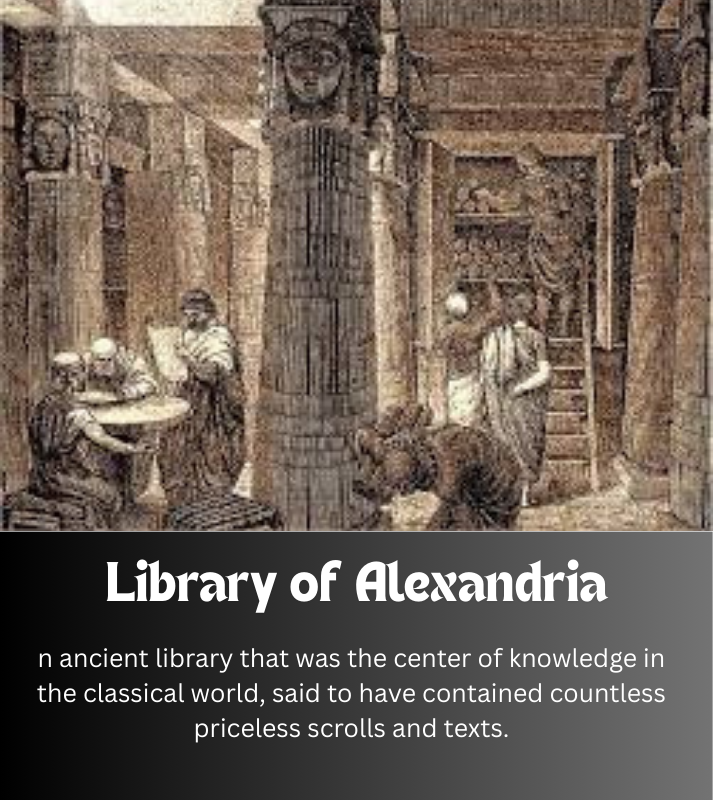The Library of Alexandria
The Lost Heart of Knowledge


The Library of Alexandria is a legend, a name that evokes a sense of both awe and profound loss. It was not just a repository of books but the intellectual center of the ancient world, a "1 in a million" institution that aimed to collect all the knowledge of its time. While no physical remains of the original structure have been found, its legacy as a beacon of learning and research remains.
A Bold Vision 📖
The Library of Alexandria was founded in the 3rd century BC during the reign of Ptolemy I Soter, one of Alexander the Great's successors who established the Ptolemaic Dynasty in Egypt. The goal was ambitious and unprecedented: to amass a copy of every known work of literature, science, and philosophy from around the world.
A Temple to the Muses: The Library was part of a larger research institution called the Mouseion (or Museum), a "Temple to the Muses," which were the Greek goddesses of the arts and sciences. The Mouseion housed scholars, poets, and scientists who were paid by the state to live and work there, free from the distractions of daily life.
The Pursuit of Knowledge: The Ptolemaic rulers were obsessed with collecting texts. It is said that ships docking in the harbor of Alexandria were required to surrender any scrolls they had on board. The library's scribes would then meticulously copy the texts and return the duplicates to the owners, keeping the originals for the collection.
A Nexus of Ancient Minds
A Nexus of Ancient Minds 🧠
The Library and Mouseion attracted the greatest minds of the classical world, transforming Alexandria into the preeminent intellectual capital.
Countless Scrolls: While the exact number is debated, estimates suggest the collection may have held anywhere from 400,000 to 700,000 scrolls. The texts covered every conceivable field, including mathematics, medicine, astronomy, history, and literature.
Famous Scholars: The Library's scholars made groundbreaking contributions that laid the foundation for modern science.
Euclid: The "Father of Geometry," who wrote his famous work, Elements, at Alexandria.
Eratosthenes: The chief librarian who accurately calculated the circumference of the Earth with astounding precision.
Aristarchus of Samos: Proposed the heliocentric theory of the solar system, with the sun at the center.
The Mystery of Its Demise 🔥
The destruction of the Library of Alexandria is one of history's great tragedies and a topic of intense debate. It's not believed to have been a single catastrophic event, but rather a slow decline over several centuries.
The Fire of Julius Caesar: The most popular theory is that the Library was accidentally burned by Julius Caesar in 48 BC during his civil war. However, it's unclear how much was actually destroyed, as historical accounts suggest the Library continued to exist and was at least partially rebuilt or restocked after this event.
Loss of Patronage: Over time, the later Ptolemaic and Roman rulers gave less financial support and attention to the institution. The collection and its scholars dispersed, and the Library's influence waned.
The Final Blows: A series of conflicts and invasions over the centuries, including a Palmyrene invasion in the 3rd century AD and the destruction of the "daughter library" at the Serapeum in the 4th century by a Christian mob, likely led to the final disappearance of the remaining collection and buildings.
Today, the spirit of the ancient Library lives on in the modern Bibliotheca Alexandrina, a stunning architectural tribute built near the site of the original, serving as a vibrant center for culture and knowledge in the 21st century.
Discover the extraordinary and unique stories.
Inspire
© 2025. All rights reserved.
